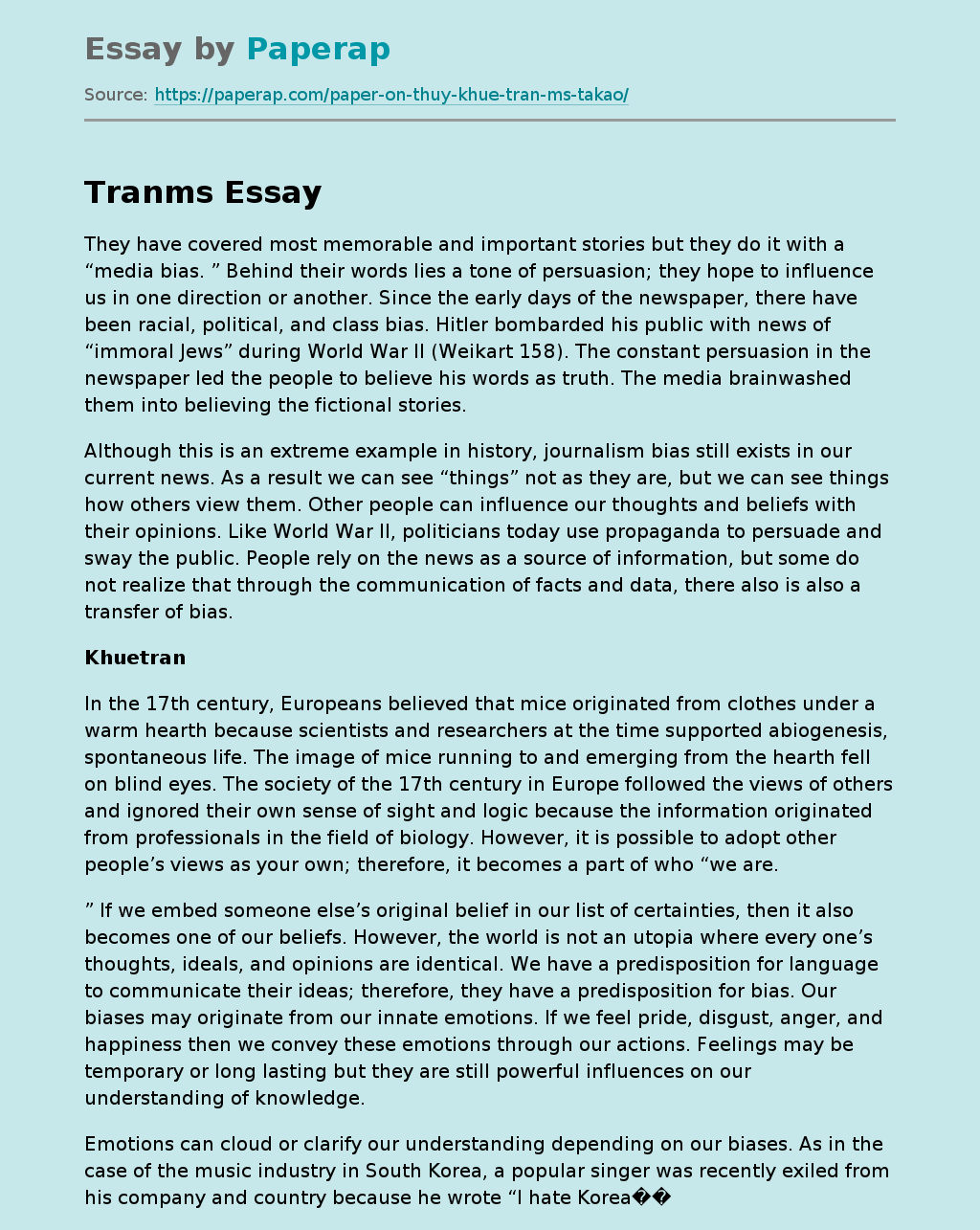Initial Belief as a List of Certainties
In the following example, an essay talks about initial belief as a list of certainties. Read the introduction, body and conclusion of the essay, scroll down.
They have covered most memorable and important stories but they do it with a “media bias. ” Behind their words lies a tone of persuasion; they hope to influence us in one direction or another. Since the early days of the newspaper, there have been racial, political, and class bias. Hitler bombarded his public with news of “immoral Jews” during World War II (Weikart 158).
The constant persuasion in the newspaper led the people to believe his words as truth. The media brainwashed them into believing the fictional stories.
Although this is an extreme example in history, journalism bias still exists in our current news. As a result we can see “things” not as they are, but we can see things how others view them. Other people can influence our thoughts and beliefs with their opinions. Like World War II, politicians today use propaganda to persuade and sway the public.
People rely on the news as a source of information, but some do not realize that through the communication of facts and data, there also is also a transfer of bias.
Khuetran
In the 17th century, Europeans believed that mice originated from clothes under a warm hearth because scientists and researchers at the time supported abiogenesis, spontaneous life. The image of mice running to and emerging from the hearth fell on blind eyes. The society of the 17th century in Europe followed the views of others and ignored their own sense of sight and logic because the information originated from professionals in the field of biology.
However, it is possible to adopt other people’s views as your own; therefore, it becomes a part of who “we are.
” If we embed someone else’s original belief in our list of certainties, then it also becomes one of our beliefs. However, the world is not an utopia where every one’s thoughts, ideals, and opinions are identical. We have a predisposition for language to communicate their ideas; therefore, they have a predisposition for bias. Our biases may originate from our innate emotions. If we feel pride, disgust, anger, and happiness then we convey these emotions through our actions. Feelings may be temporary or long lasting but they are still powerful influences on our understanding of knowledge.
Emotions can cloud or clarify our understanding depending on our biases. As in the case of the music industry in South Korea, a popular singer was recently exiled from his company and country because he wrote “I hate Korea” four years ago on a social networking website. Citizens in South Korea were upbraided and demanded that he be reprimanded by sending him back to America. Four years ago as an American immigrant, he was separated from his family, friends, and the culture that he was accustomed to; thus he wrote the words “I hate Korea.
” Although the word “hate” is exchanged casually in America, it is a great insult in South Korea. The citizens of South Korea have a overwhelming sense of pride for their country and are very nationalistic. As a result, they became angry at a remark made four years ago. Emotions took hold of the media and people of a whole country; their feelings of anger and resentment skewed their understanding of what seems like a small issue. However, this may be a case of lost in translation and cultural differences.
The “things” that we see such as beliefs, information, people and problems can be viewed objectively. As a counter claim, we can assume that some people do not have to sift through their prejudices simply because they do not have any. The counterclaim considers if it is possible to think independently of our inclinations. Do we behave according to nature or nurture? Humans are programmed by nature to be influenced by experiences, emotions, culture, and creed so they need to sort out the filters that create uncertainties and distortions in our minds, therefore refuting the counterclaim.
In the case of the observer effect, the presence of an observer may make people nervous or embarrassed by his or her attention and this may lead them to change their behavior (Lagemaat 261). The purpose of human sciences is to dissect why and how humans think and feel. Humans are born unbiased and blank as a slate– a shell without beliefs or opinions. As humans age and grow, they become biased with the accumulation of knowledge. However, human sciences do not have a method in predicting the trends in human behavior because each individual has different experiences, backgrounds and religions.
The languages that we speak, the senses we have, the culture we belong to, and the emotions that we rely upon play essential roles in people’s understanding of “how things really are. ” An individual must recognize the existence of these filters in order to identify reality which leads to the removal or altercation of the filter. Reflection, analysis, education play important roles in the process of the way we analyze and react to external and internal conflicts. People need to break apart the mechanics of perception and interpretation so they can see past the factors that block them from the pursuit of knowledge.
Initial Belief as a List of Certainties. (2019, Dec 05). Retrieved from https://paperap.com/paper-on-thuy-khue-tran-ms-takao/

